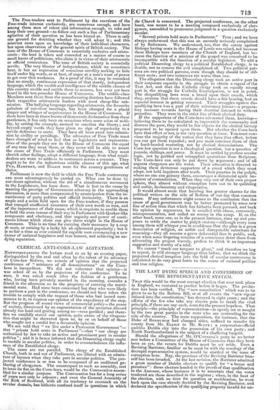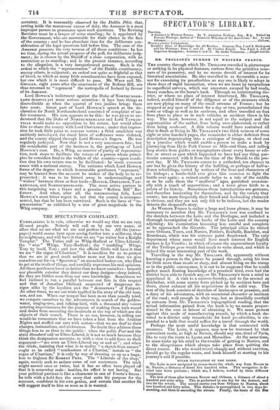THE LAST DYING SPEECH AND CONFESSION OF THE REPRESENTATIVE SYSTEM.
THAT this would be the most corrupt election that ever took place in England, we ventured to predict before it began. The predic- tion has been verified. The "new constitution" which was to be given to us by the Reform Bill, or at all events the "new vigour infused into the constitution," has decayed in eight years ; and the efforts of the few who take any sincere pain to recall the vital principle, if there are any such, seem for the present hopeless. That principle—the principle of representation—is openly set at nought by the two great parties in the state who are contending for the rule of the country. The mere supposition, for instance, that the Duke of ROXBURGH had changed sides, sufficed to transfer his county from Mr. ELLIOT to Mr. SCOTT; a corporation-official quibbles Dublin city into the possession of his own party ; and North Northumberland is the subject of a chaffering bargain. Should the allegations of Mr. O'CoxsELL's party be no better met before a Committee of the House of Commons than they have been as yet, the return for Dublin must be set aside. Even a Revising Barrister, familiar as he must he with the nosology of the decrepid representative system, would be startled at the mass of corruption here. Nay, the province of the Revising Barrister him- self has been invaded. At the last revision, the Barrister admitted a great number of Dublin electors to qualify for "a house and premises" : those electors handed in the proofs of that qualification to the Assessor, whose business it is to ascertain that the votes tendered are those described in the register ; when, in the heat of the election, with no time for question or rectification, he went back upon the case already decided by the Revising Barrister, and declared the specification of the qualifying property invalid for un-
certainty. It is reasonably observed by the Dublin Pilot, that, setting aside the monstrous excess of duty, the Assessor is a most improper person to pronounce upon such questions. The Revising Barrister must be a lawyer of some standing; he is appointed by the Government, who are answerable for their choice in the face
of the country ; and he has abundant time for the deliberate con- sideration of the legal questions laid before him. The case of the Assessor presents the very reverse of all these conditions : he has no time, during the actual progress of the poll, for deliberate judg- ment; he is chosen by the Sheriff of a close corporation, with no restriction as to standing; and in the present instance, according to the allegation, is a very inexperienced person. Such is the ordeal to which the " representation " of the Dublin constituency, among others, is subjected ; an ordeal not quite so frightful as that of blood, to which so many Irish constituencies have been exposed, but one which it is more difficult to pass. Mr. WEST and Mr. Gaosusi, eight years after the enactment of the Reform Bill, are thus returned to " represent " the metropolis of Ireland by favour of its Assessor.
Lord HOWICK'S indictment against the Duke of NORTIIIIMBER- WM deserves yet more serious attention : it lays bare things as discreditable as when the quarrel of two jockies brings them into court. Great part of Lord HOWICK'S speech at the de- claration for North Northumberland consisted of complaint of un- fair treatment. His case appears to be this : he was given to un- derstand that the Duke of NORTHUMBERLAND and Lord TANKER- VILLA would make no opposition to his return, but would allow him to share the county with Lord OSSULSTON ; under that impres- sion he took little pains to canvass voters ; a third candidate was suddenly introduced, the ducal hints of sufferance were violated, and the county slipped through Lord Howror's fingers. He was regularly jockeyed. Now that is not a very uncommon fate ; but the remarkable part of the business is, the getting-up of Lord HOWICH'S case. He, a Whig, an asserter of purity of representa- tion, took steps to facilitate the return of a person whose princi- ples he considers fatal to the welfare of the country—upon condi- tion that his own return was to be facilitated : he made common cause with a national enemy. The estimate which Lord HOWICK forms of the degree to which honourable gentlemen "represent," may be learned from the account he makes of the body to be re- presented : it was to be hinted away in understandings and "wishes" between three or four lords—Howlea, Ossursrosr, TAN- EERVILLE, and NORTHUMBERLAND. The most active partner in this bargaining was a GREY and a genuine "Reform Bill" Re- former. And when, after all, the manceuvering fails, Lord Howleit's most bitter regret is, not that the county is misrepre- sented, but that he has been outwitted. Such is the farce of "re- presentation" as exhibited by a star of great magnitude in the Whig company.



























 Previous page
Previous page